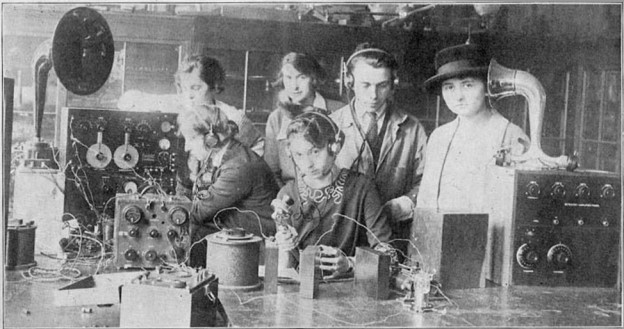At Temple University Libraries (TUL), librarian Fred Rowland began conducting interviews and sharing them as streaming audio through TUL’s website in 2007. The following interview transcript with digital humanities scholar Kathleen Fitzpatrick offers insight into her work and a discussion about the future of scholarly communication. An introduction has been added to the interview, which addresses both the transcription process and the implications of using digital media to make more scholarship available to a wider audience beyond academia.
KF: This is exactly the thing that we’ve been talking about across this conversation. That we have this romantic notion that the author produces an idea and conveys that idea perfectly into the brain of the person who is reading the text. That the reader perfectly obtains that idea and processes it in exactly the way that the author intended, should the author have done his job perfectly. And, in fact, it’s never been that straightforward. The possibility of misreading has in fact been the norm. And the reader has always been free to do with the bits and pieces of the text what he or she will.
So digital platforms really sort of call attention to this. To the act of bringing together ideas, to the act of interpretation, and particularly to the act of the creation of community between author and reader, and among readers in the act of engaging around a text. One of the things that the Internet adds most explicitly to this development of reading across its history is that it’s become profoundly a read-write medium. Readers online expect, on some level, that there will be comments available, and that they will be able to respond if they want to. If they don’t want to respond in the comments on the text that they’re reading, they can go to their own blogs and grab quotes and respond to them and have a conversation within their own communities about the things that they’re reading. [52:01]
And it’s that process of the seamless movement from reading to writing, and then back again, that I think has really distinguished the Internet in a whole lot of ways. Now there are precursors for this, of course. In earlier eras the development of the commonplace book, the commentary, and so forth.
FR: Which is oral culture, right? [52:24]
KF: Exactly, the seminar. All of this has been about the process of creating new texts around existing texts. [52:33]
FR: How do you think university presses will change in the next ten years? And do you think they should survive, or what are your thoughts? You’ve dealt with a bunch of them…
KF: I think university presses serve an absolutely crucial role for scholars in the production and dissemination of certain kinds of work. The reason university presses came into being had to do with the fact that scholars in the humanities were producing these monograph books and commercial presses didn’t want to publish them because there wasn’t a sufficient market. The university saw its responsibility as being facilitating the communication of the work that was going on within its faculty to the outside world. And so universities formed presses and they started distributing the work that was being done originally by their own faculty on their campuses to other campuses. And so the university press was born. [53:37]
But the university press over the course of the first half of the twentieth century morphs into this odd relationship to its campus, in which many university presses are now understood to be revenue centers on their campuses. They’re required at minimum to break even. There are even presses that are required to actually contribute back to their universities. There are university presses that are seen as being fully businesses that just happen to function with the university name. And I believe that those university presses serve an absolutely crucial role in the dissemination of scholarship, because they are this locus of not-for-profit communication of the work that is being done by scholars in the humanities.
But I think that those presses need to develop, and this is not something that the presses haven’t been trying to do, trust me, and I understand how difficult this is. But they need to develop a different relationship to the universities that house them. The universities really need to understand their responsibility, once again, with respect to the dissemination of scholarship. I also think that university presses need to develop a much more symbiotic relationship with, for instance, libraries, with information technology centers on campus, with academic departments, with the other aspects of what’s going on on campus, that might help fully integrate them into the life of the institution in a way that makes them see very clearly at the heart of what it is the institution does. But that would also sort of alleviate some of the wheel reinvention that has to happen with university presses now because they are adjunct to the campus, rather than being a part of the campus. [55:26]

